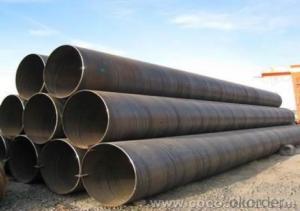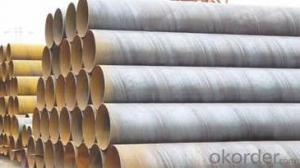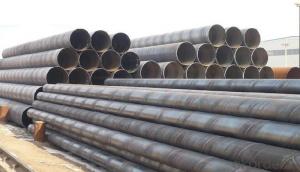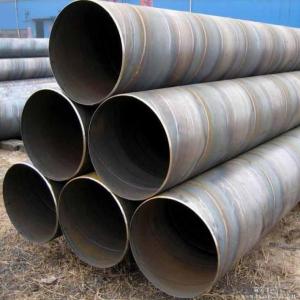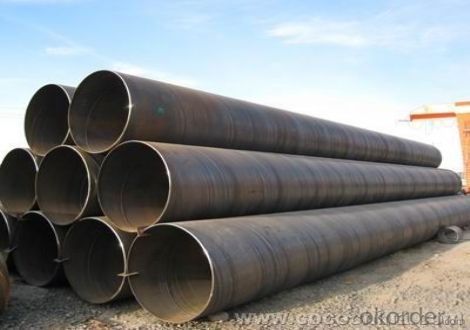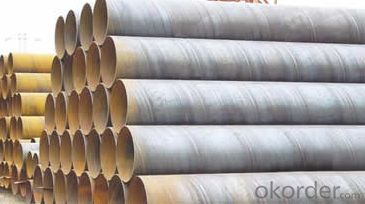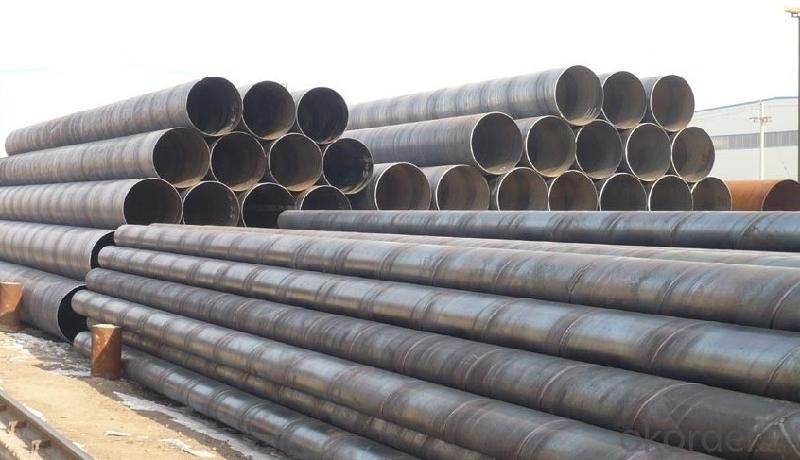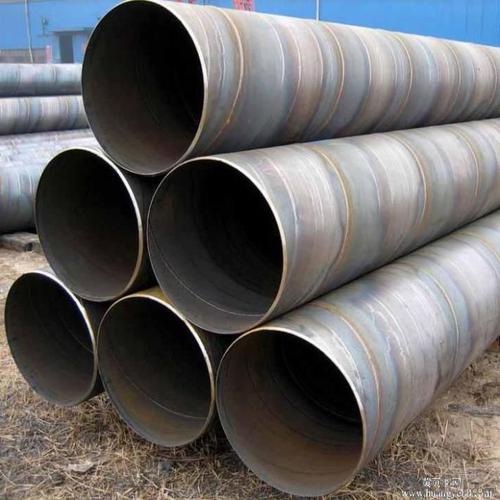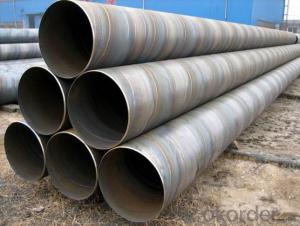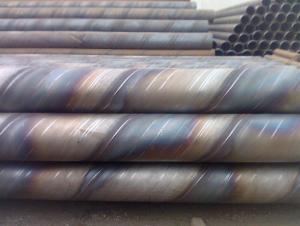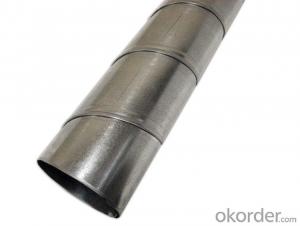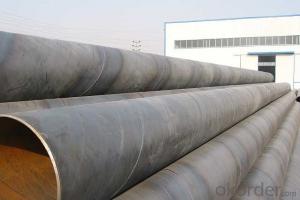SPIRAL STEEL PIPE 34’‘ ASTM API LARGE DIAMETER PIPE
- Loading Port:
- Tianjin
- Payment Terms:
- TT OR LC
- Min Order Qty:
- 5 m.t.
- Supply Capability:
- 3000 m.t./month
OKorder Service Pledge
OKorder Financial Service
You Might Also Like
Packaging & Delivery
Packaging Detail: | standard export packing or as customer's requirement |
Delivery Detail: | within 10 - 30 days |
Specifications
Spiral Welded Steel Pipes and Tubes
1.Material:Q195-Q235
2.Length:1-12m
3.WT:1.0-14mm
4.O.D.:20-273mm
Spiral Welded Steel Pipes and Tubes
Product Description:
1.Material : Q235,Q345,L245,L290,L360,L415,L450,L485,GrB,X42,46,X52,X56,X60,X65,X70,X80,X100
2,Standard: SY/T5037-2000,GB/T9711-2011,API Spec 5L PSL1/PSL2,ASTM A252\A53,ISO3183,DIN17172,EN10217,JIS G3457,AWWA C200,ASTM A139,ASTM A671,ASTM A672
3.Wall thickness: 3.0mm-30mm
4.Outer diameter: φ168mm-3020mm
5,Length: 5m-12m or as your requirement
6,Corrosion protection standard: DIN30670,DIN30671, AWWAC210, AWWA C203, SY/T0413-2002,SY/T0414-2002
7,Application: Oil, gas, natural gas, water pipe, thermal electricity pipe, steel structure engineering, etc
Q195-q345 Material Steel Pipe's Materials
Elements | Chemical Compsition% | Mechanical Property | ||||||
C% | Mn% | S% | P% | Si% | Yield Point (Mpa) | Tensile Strength(Mpa) | Elongation | |
Q195 | 0.06-0.12 | 0.25-0.50 | <0.050< span=""> | <0.045< span=""> | <0.030< span=""> | >195 | 315-430 | 32-33 |
Q215 | 0.09-0.15 | 0.25-0.55 | <0.05< span=""> | <0.045< span=""> | <0.030< span=""> | >215 | 335-450 | 26-31 |
Q235 | 0.12-0.20 | 0.30-0.70 | <0.045< span=""> | <0.045< span=""> | <0.030< span=""> | >235 | 375-500 | 24-26 |
Q345 | <0.20< span=""> | 1.0-1.6 | <0.040< span=""> | <0.040< span=""> | <0.55< span=""> | >345 | 470-630 | 21-22 |
- Q: How are steel pipes used in tunnel construction?
- Steel pipes are commonly used in tunnel construction for various purposes. They are used to provide structural support by acting as reinforcements or casings for the tunnel walls. Steel pipes also serve as conduits for utilities such as water, gas, and electricity within the tunnel. Additionally, they can be used for ventilation and drainage systems, ensuring a safe and functional environment inside the tunnel. Overall, steel pipes play a crucial role in the construction and functionality of tunnels.
- Q: How are steel pipes used in the manufacturing of conveyor systems?
- Steel pipes are commonly used in the manufacturing of conveyor systems as they provide a sturdy and durable framework for supporting and transporting materials. These pipes are used to create the structure of the conveyor, forming the framework that holds the rollers, belts, and other components in place. Steel pipes also allow for easy customization and flexibility in designing conveyor systems to meet specific needs and requirements.
- Q: Can steel pipes be used for plumbing?
- Yes, steel pipes can be used for plumbing.
- Q: What is the difference between black steel pipes and galvanized steel pipes?
- The main difference between black steel pipes and galvanized steel pipes lies in their coating. Black steel pipes are uncoated and have a dark, iron oxide layer on their surface, while galvanized steel pipes are coated with a layer of zinc to protect against corrosion. This zinc coating gives galvanized pipes a shiny, silver appearance and makes them more resistant to rust and other environmental factors.
- Q: What are the common applications of steel pipes in construction?
- Steel pipes are commonly used in construction for various applications such as structural support, plumbing, water distribution, gas transportation, and HVAC systems. They provide strength, durability, and resistance to corrosion, making them an ideal choice for these purposes.
- Q: Can steel pipes be used for conveying sewage sludge?
- Indeed, sewage sludge can be conveyed using steel pipes. Steel pipes possess several properties that render them suitable for this purpose. Firstly, their strength and durability enable them to endure the pressure and weight of sewage sludge without collapsing or fracturing. This is of utmost importance as sewage sludge can be quite heavy and may contain solids that could exert stress on the pipes. Secondly, steel pipes exhibit resistance to corrosion, which is crucial when conveying sewage sludge that frequently contains corrosive components. By utilizing corrosion-resistant steel pipes, one can ensure a prolonged lifespan and minimize the risk of leaks or damage. Moreover, steel pipes can be manufactured in various sizes and diameters, granting flexibility in the design of sewage systems to meet specific requirements. Nonetheless, it is vital to emphasize the necessity of proper maintenance and regular cleaning to prevent sludge buildup and maintain the pipes' efficiency.
- Q: Can steel pipes be used for underground compressed air pipelines?
- Yes, steel pipes can be used for underground compressed air pipelines. Steel pipes are durable, corrosion-resistant, and have high strength, making them suitable for withstanding the pressure and environmental conditions of underground installations. Additionally, steel pipes can be easily welded and are readily available in various sizes, allowing for flexibility in designing the compressed air pipeline system.
- Q: Where is the difference between seamless steel pipe and welded pipe?
- Seamless pipe pressure is higher, welded pipe is generally in 10 or so MPa, now welded pipe to do seamless processing.
- Q: How are steel pipes protected from damage during transportation?
- Various methods are used to protect steel pipes from damage during transportation. One commonly employed technique involves applying protective coatings to the pipes. Materials like epoxy, zinc, or polyethylene are often used for this purpose, creating a barrier between the pipe and external elements. These coatings effectively prevent corrosion and damage during transit. In addition, steel pipes are frequently bundled together and secured using straps or bands. This bundling ensures that the pipes remain in place and prevents any shifting or rolling during transportation. Furthermore, padding or cushioning materials, such as foam or rubber, may be utilized to provide extra protection and reduce the risk of damage from impact or vibration. Sometimes, steel pipes are placed in crates or containers to provide further safeguarding. Crates are designed to snugly fit the pipes, offering a secure enclosure that shields against external forces. On the other hand, containers create a protective environment for the pipes, shielding them from the elements and potential impacts. To guarantee the safe transportation of steel pipes, proper handling and loading techniques are crucial. Pipes should be lifted and loaded onto transport vehicles with care, utilizing suitable equipment like cranes or forklifts to minimize the risk of damage. It is also essential to properly secure the pipes within the transport vehicle to prevent any movement or potential damage during transit. Overall, a combination of protective coatings, bundling, padding, and secure packaging or loading techniques is employed to ensure the safety of steel pipes during transportation. These measures guarantee that the pipes arrive at their destination in optimal condition, ready for use in various applications.
- Q: How are steel pipes used in HVAC systems?
- Steel pipes are used in HVAC systems for various purposes such as transporting hot or cold water, steam, or refrigerant throughout the system. They are commonly used for supply and return lines, as well as for connecting various HVAC components like chillers, boilers, air handlers, and heat exchangers. Steel pipes are preferred in HVAC systems due to their durability, strength, and resistance to corrosion and high pressure.
Send your message to us
SPIRAL STEEL PIPE 34’‘ ASTM API LARGE DIAMETER PIPE
- Loading Port:
- Tianjin
- Payment Terms:
- TT OR LC
- Min Order Qty:
- 5 m.t.
- Supply Capability:
- 3000 m.t./month
OKorder Service Pledge
OKorder Financial Service
Similar products
Hot products
Hot Searches
Related keywords
